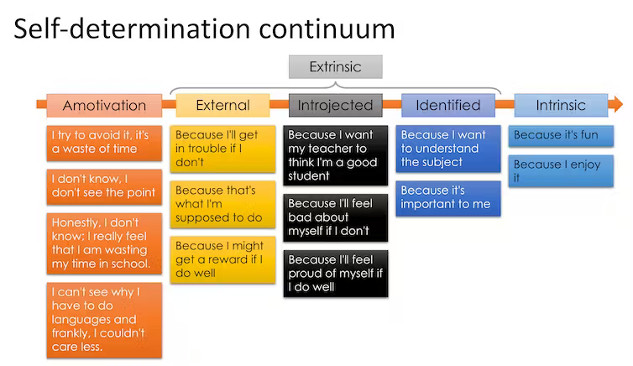
Cast Of Thousands/Shutterstock
Are you thinking about learning a language? Perhaps you’ve decided that it’s time to dust off your classroom French. Maybe you’re planning a trip to Japan and feel like you should make the effort to learn the basics, or work is sending you to the Cairo office for a year and you’ll need Arabic.
Learning a language is a hugely worthwhile endeavour, but two things are certain: it will take a while, and motivation will be crucial.
I research language learners’ motivation, using what is known as self-determination theory to measure motivation. This theory proposes that there is a continuum of motivation.
The continuum starts from the least motivated – “amotivation” – where you might resist doing a task, perhaps because you can’t see its value. The highest form of motivation is “intrinsic motivation”, which means you do something because you find it fun.
In between, along the continuum, there are different forms of motivation. Our motivation increases as we perceive the activity to be more and more aligned with our own beliefs and values.
The continuum of motivation. Abigail Parrish, CC BY-NC-ND
Self-determination theory is increasingly popular among researchers looking to explore language learning. It tells us that if you are learning a language because you think it’s important to you – because it fits with your beliefs and values – then you will want to do it. It’s not enough to know that language learning might be a good thing in the abstract; you need to find personal relevance in it.
You can try to build this motivation by setting yourself goals that revolve around connecting meaningfully with others – such as improving your ability to communicate with friends, family or colleagues in their language.
You are more likely to persevere and to do better if this is your motivation to learn, than if you are doing something for a more controlled, external reason, for example, because your boss expects it. It’s likely to make you feel happier, too.
This is why compulsory language learning in schools doesn’t necessarily yield the results we might hope for. Students often don’t have a sense of autonomy about undertaking the study in the first place.
Keep going
As well as feeling that you’re studying for your own goals, other important factors can keep you motivated on your language journey.
One key factor is known as relatedness. This means having positive relationships with those around you – your teacher, your classmates, your friends and family – and helps you thrive and find meaning in what you’re doing. If your partner supports your language learning and encourages you, you’ll be more likely to find that you’re keen to continue.
Another is competence. This is not about being the best at everything, but about feeling capable. So even if you’re a beginner, you can feel a sense of competence if you take your learning step by step and feel confident in your ability before moving on.
If language learning app Duolingo, for instance, has been telling you you’re “amazing” and the lesson is “no match for you”, you may well feel enthused to continue.
Duolingo has been incredibly popular as a way to learn a language, either instead of or alongside traditional methods such as books and lessons. Part of the model of this and other language learning apps is to reward users at every turn – for using the app on consecutive days, for completing a certain number of exercises, and even for engaging at certain times of the day.
But self-determination theory research tells us that rewards can also be demotivating. When life gets in the way or you find a lesson particularly hard and the rewards stop, you may feel adrift. The best way to find the will to keep going is to find that personal reason to learn – and remind yourself of it when the going is tough.![]()
About The Author
Abigail Parrish, Lecturer in Education, University of Sheffield
This article is republished from The Conversation under a Creative Commons license. Read the original article.

Books Improving Attitude and Behavior from Amazon's Best Sellers list
"Atomic Habits: An Easy & Proven Way to Build Good Habits & Break Bad Ones"
by James Clear
In this book, James Clear presents a comprehensive guide to building good habits and breaking bad ones. The book includes practical advice and strategies for creating lasting behavior change, based on the latest research in psychology and neuroscience.
Click for more info or to order
"Unf*ck Your Brain: Using Science to Get Over Anxiety, Depression, Anger, Freak-Outs, and Triggers"
by Faith G. Harper, PhD, LPC-S, ACS, ACN
In this book, Dr. Faith Harper offers a guide to understanding and managing common emotional and behavioral issues, including anxiety, depression, and anger. The book includes information on the science behind these issues, as well as practical advice and exercises for coping and healing.
Click for more info or to order
"The Power of Habit: Why We Do What We Do in Life and Business"
by Charles Duhigg
In this book, Charles Duhigg explores the science of habit formation and how habits impact our lives, both personally and professionally. The book includes stories of individuals and organizations who have successfully changed their habits, as well as practical advice for creating lasting behavior change.
Click for more info or to order
"Tiny Habits: The Small Changes That Change Everything"
by BJ Fogg
In this book, BJ Fogg presents a guide to creating lasting behavior change through small, incremental habits. The book includes practical advice and strategies for identifying and implementing tiny habits that can lead to big changes over time.
Click for more info or to order
"The 5 AM Club: Own Your Morning, Elevate Your Life"
by Robin Sharma
In this book, Robin Sharma presents a guide to maximizing your productivity and potential by starting your day early. The book includes practical advice and strategies for creating a morning routine that supports your goals and values, as well as inspiring stories of individuals who have transformed their lives through early rising.





















